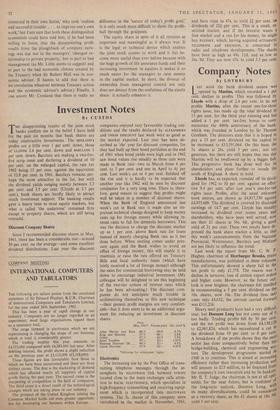Company Notes
By LOTHBURY
I AST week the bank dividend season was opened by Martins, which recorded a 1 per cent, decline in profits. This was followed bY
Lloyds with a drop of 2.4 per cent, in its net profits. Martins, after the recent one-for-three rights issue, has made up the total dividend to 15 per cent, for the third year running and has added a 1 per cent. tax-free bonus to com- memorate the 400th anniversary of the bank, which was founded in London by Sir Thomas Gresham. The directors state that it is hoped to pay a 13 per cent, dividend on the capital to be increased to £13,191,064. On this basis the 5s. shares at 26s. yield 3 per cent.; not too generous, but there are still hopes that one daY Martins will be swallowed up by a bigger fish. This progressive bank has done well for its shareholders and plans further to invade the south of England. A share to hold.
Lloyds has, as expected, rounded off its divid- dend for 1962 to 10 per cent. against an effec-
tive 9.4 per cent, after last year's one-for-ten rights issue. Profits, after the usual unknown book entries, are shown as £4,817,350 against £4,935,609. The dividend is covered by disclosed earnings of 14.7 per cent. Lloyds has steadilY increased its dividend over recent years and shareholders, who have been well served, noW
see their £1 shares at 56s. 6d., giving a good yield of 31 per cent.' These two results have de-
pressed the bank share market a little, so that this week's announcements from the National Provincial, Westminster, Barclays and Midland are not likely to influence the trend.
Last week the report from Mr. C. W. P. Hughes, chairman of Herrburger Brooks, piano manufacturers, was published in these columns. This unfortunately showed a sharp fall in the.
net profit to only £1,578. The reason was a decline in turnover, loss of certain export orders and higher costs. However, as the future oat; look is now brighter, the chairman felt justified in recommending a 5 per cent. dividend on the 10s. shares, now 10s. The dividend (less tax) costs only £4,632; the amount carried forward was £111,216.
Heavy steel producers have had a very difficill.t year, but Dorman Long has not come out of it too badly. Trading profits fell by 30 per cent; and the net profit was down from £4,130,128 to £2,981,824, which has necessitated a cut In the dividend from 10 per cent. to 8 per cent, A breakdown of the profits shows that the steel sector has done comparatively better than the bridge-building, chemical and engineering sec' tors. The development programme started t° 1960 is to continue. This is aimed at increasiq efficiency rather than increasing production an° will amount to £13 million, to be financed front the company's own resources and by its bankers.' Mr. E. T. Judge, the chairman, is not at all opt': mistic for the near future, but is confident .0' the long-term outlook. Dorman Long, with, its many diversifications, could be considete? as a recovery share, as the £1 shares at 18s. 94,' yield 9 per cent.






























 Previous page
Previous page